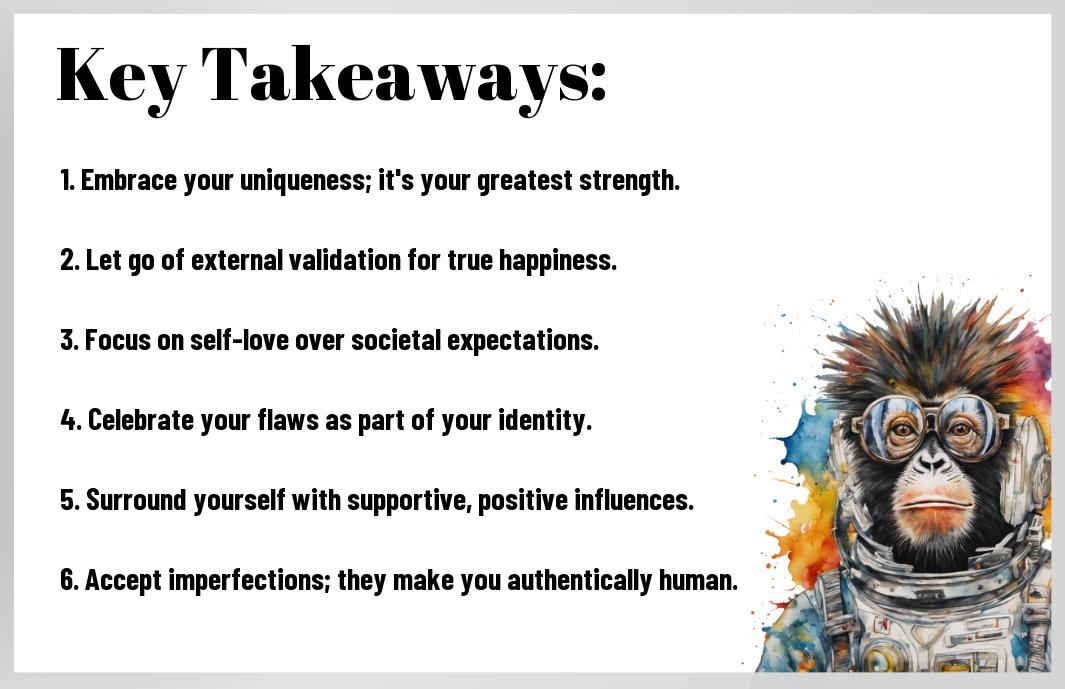
Newsletter Subscribe
Enter your email address below and subscribe to our newsletter

Enter your email address below and subscribe to our newsletter

Just like many of you, I’ve struggled with self-acceptance in a world that often pressures us to conform. It’s necessary to embrace who you are, letting go of the burden of others’ opinions that can weigh heavily on your self-esteem. In this blog post, I’ll share insights and strategies to help you discover the freedom of accepting yourself as you are. Ultimately, it’s about prioritizing your happiness and well-being, fostering a sense of empowerment to live authentically without compromise.


Before I can fully embrace who I am, it’s crucial to understand the concept of self-acceptance. This journey is about acknowledging and appreciating my true self, including my strengths and weaknesses. Self-acceptance allows me to be authentic, freeing me from the constraints of societal expectations and the opinions of others.
For me, self-acceptance means recognizing and appreciating my individuality. It’s about embracing my flaws and strengths without judgment or comparison to others. I realize that this acceptance is the foundation for my emotional well-being and personal growth.
The journey of self-acceptance is vital for my mental and emotional health. By accepting myself, I cultivate resilience and confidence, allowing me to navigate life’s challenges without undue stress. I learn to prioritize my needs and desires over external pressures, leading to a more fulfilling life.
Plus, practicing self-acceptance fosters a greater sense of inner peace and well-being. It allows me to build authentic relationships, as I’m no longer seeking validation from others. In doing so, I lower the risk of anxiety and depression, as I’m not constantly comparing myself to others. Embracing my true self ultimately leads to a more joyful and satisfied existence, as I focus on my personal journey rather than the opinions that may weigh me down.
Clearly, the opinions of others can shape how we view ourselves and the choices we make. Often, I find that I let external judgments create boundaries that limit my self-expression and authenticity. This societal pressure can lead to a cycle of dissatisfaction, as I worry more about fitting in than embracing who I truly am. Navigating these influences is vital in my journey towards self-acceptance.
Between societal norms and cultural expectations, I have often felt pressured to conform to a specific image. These conditions are deeply ingrained, setting standards that I feel compelled to meet, and sometimes I struggle to break free from them. It’s vital to recognize these influences, as they can distort my self-perception and hinder my ability to fully appreciate my individuality.
Against the backdrop of societal influences, I grapple with the fear of judgment, which often paralyzes my desire to express my true self. The idea of rejection can be overwhelming, making me second-guess my decisions and suppress my voice. Understanding that judgment is a natural part of human interaction can help in reducing the power it holds over me.
Hence, overcoming the fear of judgment requires a profound shift in how I view myself and my place in the world. I must embrace my uniqueness and learn that authenticity often invites criticism, but also fosters connection with those who appreciate me for who I am. By shifting my focus from external approval to self-acceptance, I can cultivate a sense of confidence that challenges the hold others’ opinions have on my life. Ultimately, this journey empowers me to live fully and authentically.
Not everyone will appreciate your uniqueness, and that’s perfectly okay. The key to embracing yourself lies in accepting your imperfections and celebrating your strengths. I encourage you to explore different strategies that resonate with you, whether it’s journaling, engaging in creative pursuits, or surrounding yourself with supportive individuals. While the journey to self-acceptance may require effort, it’s ultimately a rewarding process that fosters authenticity and joy in your life.
At times, we can be our own worst critics, but cultivating self-compassion allows us to treat ourselves with the same kindness we offer others. I suggest you begin by acknowledging your feelings, validating them, and understanding that everyone struggles. When I find myself facing challenges, I consciously remind myself that it’s okay to be imperfect and to embrace my humanity. This gentle approach creates a nurturing space for personal growth.
Embracing mindfulness enables me to connect with the present moment and appreciate my true self without judgment. By becoming aware of my thoughts and feelings, I begin to recognize patterns of negativity and instead focus on my experiences as they unfold. The practice of mindfulness encourages self-awareness and allows me to ground myself in the here and now. This shift not only enhances my emotional resilience but also enables me to offer compassion to myself. Whether through meditation, deep breathing, or simply observing my surroundings, mindfulness becomes a powerful tool in my journey toward self-acceptance.
Once again, I find that positive affirmations serve as a powerful tool in nurturing self-acceptance. By repeating affirmations that resonate with my values and goals, I can significantly reprogram negative self-talk and foster a more compassionate view of myself. These affirmations act as a reminder that I am deserving of love and respect, regardless of others’ opinions. It’s an empowering practice that reinforces my journey toward embracing who I truly am.
Above all, cultivating a healthy self-image is vital for my self-acceptance. When I focus on my strengths rather than my shortcomings, I can start to view myself through a lens of positivity. This shift encourages me to appreciate my uniqueness and to understand that imperfections are part of being human. As I build this foundation, my confidence grows, allowing me to live authentically without the weight of judgment from others.
Among the methods I’ve discovered, incorporating affirmations into my daily routine can significantly enhance my mindset. By setting aside a few moments each day—whether in the morning or before bed—I can recite my affirmations with intention. These practices create a consistent reminder of my worth, reshaping my thoughts and ultimately influencing my actions.
Considering how transformative daily affirmations can be, I have made it a priority to integrate them seamlessly into my life. When I wake up, I take a moment to look in the mirror and speak kind words to myself, acknowledging my inherent value. I often write my affirmations in a journal or place sticky notes in visible areas to provide ongoing motivation throughout the day. This consistent reinforcement not only boosts my self-esteem but also cultivates a deeper belief in my capabilities and worth, enabling me to move more confidently through life.
Keep in mind that navigating change is a part of growth that allows me to deepen my self-acceptance. It often requires me to challenge my comfort zones and let go of how others perceive my journey. For practical tips on focusing on myself, I find it helpful to explore How To Stop Worrying About Others And Focus On Yourself.
By accepting that perfection is unattainable, I find freedom in my imperfections. Acknowledging my flaws, instead of hiding them, allows me to appreciate my unique journey. It’s a liberating realization that my own worth isn’t tied to the unrealistic standards set by society.
Behind every challenge I face lies an opportunity for resilience. Building it takes time, but with each setback, I learn to adapt and grow stronger. I focus on my ability to bounce back from adversity rather than dwell on failures.
Also, fostering resilience is key to handling life’s inevitable ups and downs. By cultivating a positive mindset and learning to view setbacks as opportunities, I can navigate challenges more effectively. Investing my time in self-care practices and supportive relationships enhances my commitment to resilience. Ultimately, it empowers me to face obstacles with a sense of strength and determination, enabling me to grow and transform through each experience.

After embracing self-acceptance, I learned the significance of supporting others in their journey. By helping those around us foster a positive sense of self, we create an environment that nurtures growth and understanding. If you’re seeking ways to assist your friends, consider exploring How to Embrace Self-Acceptance for insights and strategies.
To truly encourage self-acceptance in your relationships, express genuine appreciation for the unique qualities in others. Acknowledging their strengths fosters a deeper connection, allowing them to feel valued and more comfortable in their own skin.
Among the most rewarding aspects of self-acceptance is the ability to cultivate a supportive community. Surrounding myself with people who uplift and inspire one another enhances our confidence and self-worth.
Others thrive when they have a community that accepts and values them. By creating space for open dialogues, sharing experiences, and celebrating victories, we can contribute to a positive environment. Together, we can combat negativity by showcasing strength in our differences and encouraging one another through setbacks. By nourishing our connections, we foster a rich community where everyone can feel free to embrace their authentic selves without the burden of others’ judgments.
So, I encourage you to embrace who you are without being weighed down by the opinions of others. Your individuality is your strength, and accepting yourself fully opens the door to true happiness and growth. When I prioritize my own values and self-worth over external validation, I find peace and authenticity. Let go of comparisons and societal expectations; focus on what makes you unique and worthy. By doing so, you empower yourself to live life on your own terms, creating a more fulfilling journey.
A: Self-acceptance is the practice of recognizing and embracing your true self, including your strengths, weaknesses, and unique traits, without seeking validation from others. It fosters a healthier relationship with oneself, leading to improved mental well-being, self-esteem, and the ability to pursue goals authentically.
A: Start by cultivating self-awareness. Reflect on your feelings, thoughts, and behaviors. Engaging in journaling or meditation can help clarify your perceptions. Additionally, practice self-compassion; treat yourself with the same kindness you’d offer a friend in similar situations.
A: Others’ opinions can influence your self-view, often leading to doubt or concern about your worth. However, self-acceptance encourages you to prioritize your own beliefs and values over external feedback. This allows you to define yourself on your terms, rather than conforming to societal expectations.
A: Yes, self-acceptance can significantly enhance your relationships. When you accept yourself, you are more likely to express your authentic self, communicate openly, and set healthy boundaries. This authenticity fosters deeper connections and provides a space for others to feel comfortable being themselves.
A: Common challenges include ingrained self-judgment, fear of rejection, and comparing yourself to others. These barriers can create feelings of inadequacy. It’s important to confront these thoughts and replace them with positive affirmations about your worth and uniqueness during your self-acceptance journey.
A: Combat negative self-talk by becoming aware of these harmful inner dialogues. Challenge these thoughts by questioning their validity and replacing them with affirming statements. Surround yourself with supportive individuals who uplift you, and engage in activities that promote positivity and self-expression.
A: Self-acceptance is an ongoing process rather than a final destination. It requires continuous reflection and adjustment as you grow and encounter new life experiences. It’s normal for your feelings of self-acceptance to fluctuate, but committing to this journey will yield lasting benefits in your overall well-being.